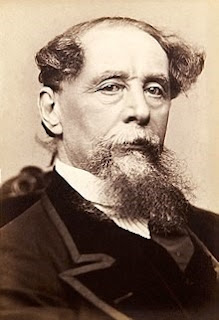Why Charles Dickens Remains a Beloved and Renowned Writer — Dr. Ian Weisberg
 |
| Why Charles Dickens Remains a Beloved and Renowned Writer - Dr. Ian Weisberg |
Charles Dickens, the world's most famous author, has certainly made a name for himself over time. His characters and narrative have resonated with readers worldwide, making this beloved writer adored and respected even hundreds of years after his works were first published.
Who Was Charles Dickens?
The prolific writer and social critic was born on February 7, 1812, in Portsmouth, England. Being familiar with financial difficulties at an early age, he began working in a factory when he was only a child. These life experiences made a lasting impact on his writing style and storylines. It fueled his passion for social reform and empathy for people who had been dealt bad hands in life.Dickens became well-known after publishing "The Pickwick Papers" in 1836. From there, he continued to write novels, short stories and essays that captivated readers far and wide.
Impact on Culture & History
Charles Dickens’s influence is hardly quantifiable. He didn’t just tell tales — he gave voice to those who weren't being listened to by society's elite. By shining light on the injustices faced by marginalized people in Victorian England, Dickens made folks across the country more aware of these issues.And it worked. His work started conversations about poverty levels brought awareness to class disparity in the country that continues today.
In addition to this work as a social reformer, many believe that Dickens's works have become teaching tools that are here to stay -- as they should be! Generations upon generations have studied his novels during their English courses. And let’s not forget all the memorable characters: from Ebenezer Scrooge to Oliver Twist — every single one of them has turned into a cultural icon over time.
Top Ten Masterpieces
A Tale of Two Cities (1859) - This novel is set against the backdrop of the French Revolution & explores themes such as resurrection sacrifice along with freedom struggles.Great Expectations (1861) - A coming-of-age tale that revolves around an orphan named Pip. The ambitious youngster embarks on a journey of self-discovery, all while exploring themes of social class and the consequences that come with one's actions.
Oliver Twist (1838) - This book tells the story of a young orphan boy who is forced to look at life through a lens most children don’t have to experience so early on. It questions how poverty corrupts society as well as what’s right or wrong.
David Copperfield (1850) - One of Dickens's most autobiographical works. It details the life of David Copperfield from when he was a child up until he reaches adulthood. Although it doesn’t sound like your typical page-turning thriller, this piece delves into themes such as personal identity and family struggles.
Bleak House (1853) - This complex narrative intertwines several stories, critiquing Britain’s judiciary system that didn't exactly work in favor for many people during those times.
Hard Times (1854) - Written to criticize the Industrial Revolution and its dehumanizing effects. The author condemns prioritizing facts over human sympathy and creativity, making his novel a modern critique of our society.
Little Dorrit (1857) - This novel is centered on Amy Dorrit, a character who grows up in a debtors' prison. It’s an expose on the government and society of British life. Dickens shows us the flaws in their class system, and how bureaucracy has taken over love and redemption.
A Christmas Carol (1843) - A story that we all know by heart. The timeless classic about Scrooge's transformation from an old miser to a warm-hearted man will always be relevant today. It is the epitome of hope and humanity.
Nicholas Nickleby (1839) - In this novel, Dickens uses humor to criticize social norms while following Nicholas Nickleby’s journey through some very strange characters. His satirical take on education systems and Victorian society makes for “one-of-a-kind" reading experience.
The Old Curiosity Shop (1841) - Join Nell Trent as she fights through suffering with her grandfather at her side in hopes for redemption ahead. This book looks into her innocence, suffering, and the issues between countryside vs city life during that time period.
Top 10 Famous Quotes
"It was the best of times, it was the worst of times..." - A Tale of Two Cities"I am not bound to win, but I am bound to be true. I am not bound to succeed, but I am bound to live up to what light I have." - Abraham Lincoln
"Pip, dear old chap, life is made of ever so many partings welded together..." - Great Expectations
"There is nothing in the world so irresistibly contagious as laughter and good humor." - A Christmas Carol
"Please, sir, I want some more." - Oliver Twist
"Accidents will occur in the best-regulated families." - David Copperfield
"The law is an ass—an idiot." - Oliver Twist
"It is a far, far better thing that I do, than I have ever done; it is a far, far better rest that I go to than I have ever known." - A Tale of Two Cities
"Reflect upon your present blessings, of which every man has plenty; not on your past misfortunes, of which all men have some." - A Christmas Carol
"No one is useless in this world who lightens the burdens of another." - Doctor Marigold
Dickens’s work has done a great job showcasing his talent and passion. His characters are memorable and their stories are unique. Because of this, he will always have a place in literary history. Though he lived long ago, we can still take his work as inspiration or entertainment today. Charles Dickens’s influence will carry on for many generations to come. – Dr. Ian Weisberg
Dickens’s work has done a great job showcasing his talent and passion. His characters are memorable and their stories are unique. Because of this, he will always have a place in literary history. Though he lived long ago, we can still take his work as inspiration or entertainment today. Charles Dickens’s influence will carry on for many generations to come. – Dr. Ian Weisberg
Originally published at https://drianweisberg.medium.com on March 22, 2024.



Comments
Post a Comment